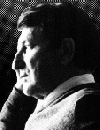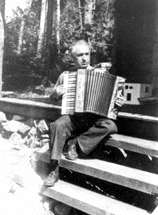|

In his general theory of relativity Einstein astounded the world when he said that space and time are not separate entities,
but are smoothly linked and part of a larger whole he called the space-time continuum. David Bohm takes this idea a giant
step further. He says that everything in the universe is part of a continuum. Despite the apparent separateness of things
at the explicate level, everything is a seamless extension of everything else, and ultimately even the implicate and explicate
orders blend into each other.

Wilhelm Reich was a physician-scientist whose investigation of the energy functions in human emotions led to the discovery
of an unknown energy which exists in all living matter and in the cosmos. He called this energy "orgone."
Born in 1897 in the Austrian province of Galicia, Reich graduated from the Medical School of the University of Vienna
in 1922. A student of Sigmund Freud, he became one of the great psychoanalytic pioneers before his clinical studies led him
into the laboratory and to investigations of the energy processes in nature at large.
An avowed anti-fascist, Reich
came to the United States in 1939 where he continued to study the manifestations and laws of orgone energy and to invent ways
to make this energy usable. In 1947, the Federal Food and Drug Administration began a determined attack designed to destroy
Reich's work. It obtained an injunction against Reich by default and in March, 1957 Reich was imprisoned for "contempt
of court." He died in Lewisburg Penitentiary on November 3, 1957.

Laing's writings were a beguiling mix of psychoanalysis, mysticism, existentialism and left-wing politics. They make for powerful
and often disturbing reading; disturbing because they so clearly demonstrate the extent to which the average human being is
entrapped by the pressures of social conformity. His first book, The Divided Self, was an attempt to explain schizophrenia
by using existentialist philosophy to vividly portray the inner world of a schizophrenic, which Laing presented as an attempt
to live in an unlivable situation. His later books, such as Self and Others and The Politics of Experience, expand upon this
to show how contemporary culture conspires to rob us of our individuality.
Laing remains a highly enigmatic figure.
His work tends to be dismissed by most psychiatrists; however, droves of mentally ill people insist that this was a man who
truly understood how they felt. Laing always insisted that psychotherapists should act as shamans, exorcising the illness
through a process of mutual catharsis. This is particularly apt, since, like the archetypal shaman, Laing did not appear to
so much preach a doctrine as live it. His self-destructive tendencies and mood swings are well documented. In 1989 he died
of a heart attack at the age of 62, his health ruined by years of depression and alcoholism.
Since Laing refused
to view mental illness in biomedical/clinical terms, he has often been labelled as part of the so-called 'antipsychiatry'
movement, alongside figures such as David Cooper, Thomas Szasz and Michel Foucault. However, Laing vehemently rejected this
label. He never tried to deny that mentally ill people are in need of help - he simply did not believe that conventional psychiatry
provided the answer. He was especially opposed to the use of lobotomies, ECT and the dehumanising effects of incarceration
in psychiatric hospitals.
|
